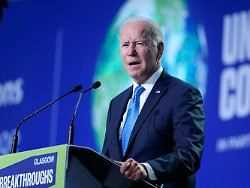Tuesday, November 02, 2021
Reduce emissions by 30 percent
More than 80 states seal the methane pact
The release of methane into the atmosphere has made a significant contribution to global warming. At the World Climate Conference, more than 80 countries are joining an EU and US initiative to reduce emissions. However, some of the largest emitters are not included.
At the UN climate conference COP26, dozens of countries committed themselves to lower methane emissions and better protection of forests: More than 80 heads of state and government joined an EU and US initiative to reduce methane emissions in Glasgow. This step will “curb climate change immediately,” said EU Commission President Ursula von der Leyen.
Previously, more than a hundred countries had passed a declaration that deforestation should be stopped by 2030. Methane emissions are expected to decrease by at least 30 percent by 2030 compared to 2020. Methane is one of the most powerful greenhouse gases; it is around 80 times more harmful to the climate than CO2. It is released, among other things, in agriculture during the digestive process of cattle and in the natural gas, oil and coal industries.
According to experts, the latest initiative could have a strong short-term effect in the fight against the climate crisis. “One of the most important things we can do by 2030 to keep the 1.5 degree target within reach is to reduce our methane emissions as quickly as possible,” said US President Joe Biden, referring to the Paris Agreement The goal set in 2015 to limit global warming to 1.5 degrees compared to the pre-industrial era.
Biggest issuers do not join
According to this, countries that are responsible for around half of global methane emissions are involved in the agreement. However, some of the largest emitters such as China, India, Russia and Australia did not join the push. Deutsche Umwelthilfe welcomed the initiative and called on the SPD, Greens and FDP to anchor a national reduction target and a German methane strategy in the coalition agreement.
Numerous states also agreed to intensify the fight against the global destruction of forests. The signatories also include Brazil and Russia. “I am glad that we have now achieved this cooperation,” said the German Environment State Secretary Jochen Flasbarth about the initiative. However, he emphasized that money alone was not enough to protect the forests: “You also need the conscious involvement of the countries that guard these forests.” In this respect, it is “a bit of hope” that Brazil has also joined the agreement. The South American country, like Russia, has been criticized for the rapid deforestation of its forests.
Behind the declaration are more than a hundred states that collectively house more than 85 percent of the world’s forests, including the boreal coniferous forests in Canada, the Amazon rainforest in Brazil and the tropical rainforest in the Congo Basin. The project is supported with almost 20 billion dollars (17 billion euros) in financial commitments from public and private funds.
Deforestation continues unabated
British Prime Minister Boris Johnson emphasized the importance of forests for the 1.5 degree target. “Climate change and biodiversity are two sides of the same coin,” he said. US President Biden also emphasized that the forests are an “indispensable component in order to achieve our climate goals”. The British government described the project as “unprecedented”.
However, around 200 participants at a UN climate change meeting in New York announced in 2014 that they would halve the deforestation rate by 2020 and stop deforestation by 2030. Nevertheless, deforestation on an industrial scale has so far continued unchecked, not least in the Amazon rainforest under the government of right-wing Brazilian President Jair Bolsonaro.
The environmental protection organization Greenpeace criticized the Glasgow initiative as inadequate. This practically gives the green light “for another decade of deforestation”. Indigenous people rightly demanded that 80 percent of the Amazon should be protected by 2025, stressed Greenpeace.
